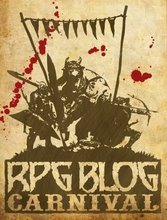
Part of the D&D Bloggers Carnival.
5 Rules for Smart D&D Players
It is the moment I love. That moment when the GM stares at you, first in disbelieve and then in realisation of what it means. The moment your cunning plan comes together and the GM suddenly finds all his plans falling apart. I love it even when I’m the GM. It is not about the players ruining the adventure but about them immersing themselves in your world so much they see things you don’t. To a GM, having players think that hard about your game is a tribute.
D&D in particular lends itself to this because of the huge variety of classes, feats, items and spells. There are so many potential combinations that there is always some new trick waiting to be discovered. But to find it, to be a smart D&D player and flummox your GM, there are five important steps.
1. Lay the Groundwork
There are limited opportunities for a fighter who stands there and hits things with swords. Classes like Bards and Monks have all sorts of interesting abilities that can be subverted. Spell casters also have a big head start but with modern versions of D&D, even the humble fighter can be smart. Feats and skills that allow extra movement or different types of movement ( e.g. Spring Attack or Tumble) are effective when combined with grapple, trip or disarm. Suddenly your boring fighter can be standing where they are least expected, putting a big spanner in your GM’s careful prepared plan of attack.
2. Unconsidered Trifles
Throughout their adventuring career, a character will collect a variety of wondrous items that are not worth keeping. Would your average fighter prefer to have an Eversmoking Bottle or its 2,200gp sale price? Whilst most would take the money, the smart character collects these miscellaneous objects because they give options. They may be useless on their own but combined with other powers or the right situation and they can be game changers.
3. Know Your Spells
Smart spell selection is vital but that doesn’t mean picking the spells with the most bang per buck. Spells that may do little directly often have no saving throw. The 1st level spell Fairy Fire has no saving throw but it can be used to cancel out much more powerful abilities like Invisibility or Blur. The sort of magic a boss monster might be relying on, opening them up to a world of pain from your front rank fighters.
Consider spells that attack creatures indirectly. A Grease spell against giants and other large creatures is incredibly useful because it targets reflex rather than AC. Such unexpected obstacles and hinderances are especially effective when the GM has carefully planned an encounter or you are caught by surprise. Slowing down the enemy, buying the party an extra round to prepare can be the difference between life and death.
4. Ask Questions
Often, the fun of the game is getting swept up in the situation but that is not good for smart play. Being able to step back and question your assumptions about the situation and also the GM’s assumptions. Instead of thinking about the obvious question of “How can I do the most damage?” ask “How can I help someone else do the most damage?” or better yet “How can I disrupt the enemies plans?”.
Examine your magic items and ask yourself “What can I do with these that is not expected?” – Often the answer is nothing, but just occasionally that Eversmoking Bottle or that Figurine of Wondrous Power suddenly presents itself as the perfect tool for the job.
5. Smart Gamers Practice at Being Smart
Opportunities to dumbfound your GM only present themselves rarely and you cannot expect to spot them unless you are constantly vigilant. In each and every encounter you need to be reviewing your abilities and items to see what you can do. Only by doing this have you a chance of finding the right action for the right situation that out-thinks the GM.
It takes work and practice to get become a smart D&D player but when it comes together, the look on the GM’s face is priceless.

